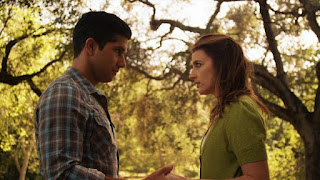There are good ideas at work in The Park Bench, but they can’t escape from the film’s all-too-expected story progression. College students learning more about each other through literature: great! Animated vignettes that break up the film’s visual style: great! But a narrative where exactly what you think will happen is exactly what ends up happening: not great.
The Park Bench focuses on the relationship between
college student Mateo (Walter Perez) and his American literature tutor Emily
(Nicole Hayden). He needs a good grade in the class to maintain his
scholarship, and Emily, proud of her know-it-all personality, is planning on a
master’s of library science degree after her own upcoming graduation. At first,
they have practically nothing in common: she lists Twain, Faulkner, and
Hemingway as her favorite authors, but Mateo doesn’t have any clear
preferences. He wants to keep meeting on a bench outside for their tutoring sessions,
and she doesn’t understand why they can’t work in the library. And when their
first meeting ends, they both look miserable.
But as the film moves forward, using the bench as
their only meeting point and the only location of the film, their familiarity
grows. The bench transforms from being a place they’re trapped by to an
intimate, confessional place for the pair: Emily talks about her upcoming wedding
and her anxiety; Mateo talks about illegally crossing the border as a child with
his family; she talks about her interest in musicals; he teaches her about
Mexican food and his mother’s cooking. And, as you can guess, what began as an antagonistic
relationship becomes something like friendship – and eventually, something
more.
It’s not that The Park Bench is badly done, because
the actors exhibit a familiarity with each other that is comforting. Hayden is
standoffish and Perez is mocking, but they warm to one another believably, and
the legitimacy of their friendship is conveyed nicely. But the film uses
American literature as a central point, and never goes deep enough with it;
there’s an argument about The Great Gatsby that brings up Mateo’s childhood (“Gatsby’s
a wuss” is Mateo’s analysis) and Emily praises Walt Whitman as a “sensualist”
who publicized women’s sexuality, but the script doesn’t go deep enough into
the material.
There isn’t enough here for literature nerds to be
pleased by, but there also isn’t enough of the rest of the film. The limited
setting means the film never expands its scope or analyzes its characters with
other people or in other locations, and because The Park Bench so obviously
follows the romantic-comedy format, you won’t be surprised by the conclusion,
either. And ultimately, there’s something irritating about how the film
positions Emily as an elitist who has to be taught to open up to the real world
by Mateo, the immigrant and the less-book-smart one, to embrace happiness. Isn’t
that demeaning to both characters?
For what it is, The Park Bench has some moments of genuine
emotion, and the falling-in-love-over-literature idea is a solid one. But it
never attempts to be more than a product of its genre, and in that way, The
Park Bench is too limited for its own good.
Rating: 2.5 out of 5
Guttenbergs

















